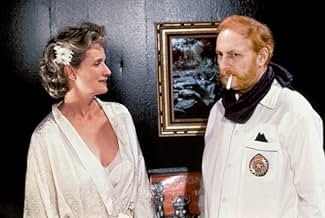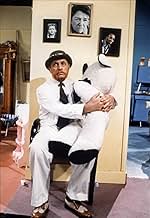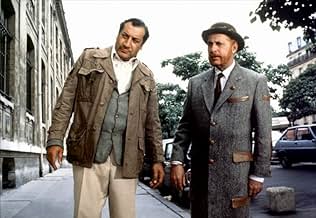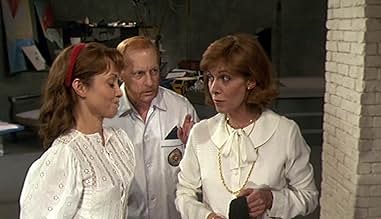Adicionar um enredo no seu idiomaAlex lost his job and home. He meets the lesbian Caroline who gives him a new start.Alex lost his job and home. He meets the lesbian Caroline who gives him a new start.Alex lost his job and home. He meets the lesbian Caroline who gives him a new start.
Lauren Grandt
- Greta
- (as Laura Grandt)
Maaike Jansen
- Yvonne Dumont
- (as Maïke Jansen)
- Direção
- Roteiristas
- Elenco e equipe completos
- Produção, bilheteria e muito mais no IMDbPro
Enredo
Você sabia?
- ConexõesReferences Zaroff, o Caçador de Vidas (1932)
Avaliação em destaque
The wonderful Michel Serrault plays Alex, a semi-vagrant in detachable clothes who walks into strangers' apartments, pretends to be a relation or official to get a meal and bed for the night, before returning to his home in a tenement cubbyhole. It appears that Alex has not only lost his wife but his job too. While somehow, HARVEY-like, transforming the lives of those he intrudes upon, he is being shadowed by a double who promptly robs them. A farcical detective case ensues which, as it typical of French cinema, opts for a troubling, diffuse solution, rather than a straightforward, cathartic one.
The film is apparently a comedy, from Alex's clown-like garb to the jaunty, melodic, Tati-esque score. However, much of the humour is verbal and depends on tortuous word-play that went way over my Intermediate-level-French head. Even so, there is some charm in Alex's meetings, the disjunction between an apparent tramp and the generally well-heeled lives he encounters.
In many ways, Alex is a Benjaminian flaneur, absolved from social expectations after his responsibilities (marital and work) are lifted; he is free, in a way most citizens are not, to negotiate a vast, sprawling, increasingly faceless metropolis, to connect seemingly different people and classes, to trawl through the unnoticed detritus (rubbish bins, sewers etc) that are in fact the lifeblood of any city. The film which opens with a long shot of a busy street, full of different and opposing lives and desires, becomes something more manageable and comforting.
Linked to this, however, is the loss of a reassuring place in society that work and social relations give; the feeling of being let drift, afloat, unnoticed. Many lonely lives pass like this, and Serrault, the main reason for watching this film, suggests the melancholy behind his comic facility. This increasing alienation from one's society, one's self even, is figured in the double/detective plot. The figure of the fictional detective actually arose as a result of urbanisation, a reassuring figure who could map out and control the ever-growing, frightening city. The detectives here, however, are fools, and their solutions are anything but reassuring, slightly disturbing the overall complacency of BONSOIR.
The film is apparently a comedy, from Alex's clown-like garb to the jaunty, melodic, Tati-esque score. However, much of the humour is verbal and depends on tortuous word-play that went way over my Intermediate-level-French head. Even so, there is some charm in Alex's meetings, the disjunction between an apparent tramp and the generally well-heeled lives he encounters.
In many ways, Alex is a Benjaminian flaneur, absolved from social expectations after his responsibilities (marital and work) are lifted; he is free, in a way most citizens are not, to negotiate a vast, sprawling, increasingly faceless metropolis, to connect seemingly different people and classes, to trawl through the unnoticed detritus (rubbish bins, sewers etc) that are in fact the lifeblood of any city. The film which opens with a long shot of a busy street, full of different and opposing lives and desires, becomes something more manageable and comforting.
Linked to this, however, is the loss of a reassuring place in society that work and social relations give; the feeling of being let drift, afloat, unnoticed. Many lonely lives pass like this, and Serrault, the main reason for watching this film, suggests the melancholy behind his comic facility. This increasing alienation from one's society, one's self even, is figured in the double/detective plot. The figure of the fictional detective actually arose as a result of urbanisation, a reassuring figure who could map out and control the ever-growing, frightening city. The detectives here, however, are fools, and their solutions are anything but reassuring, slightly disturbing the overall complacency of BONSOIR.
- alice liddell
- 6 de jun. de 2000
- Link permanente
Principais escolhas
Faça login para avaliar e ver a lista de recomendações personalizadas
Detalhes
- Tempo de duração1 hora 25 minutos
- Cor
Contribua para esta página
Sugerir uma alteração ou adicionar conteúdo ausente
















